Artists worldwide are creating powerful responses to climate change and other man-made environmental disasters.
Over its 56-year history, ACC has been proud to provide cultural exchange opportunities for many artists whose work and research further public engagement and international discourse around this global issue. Over the last decade alone, ACC supported an American artist whose installation work focuses on the Great Pacific Garbage Patch (GPGP); an Indian artist who paints canvases with polluted sediment from the Yamuna River in Delhi to call attention to the extreme degradation of South Asia’s water sources; and a Cambodian architect addressing Phnom Penh’s rampant over-development—a phenomenon felt across cities throughout Asia.
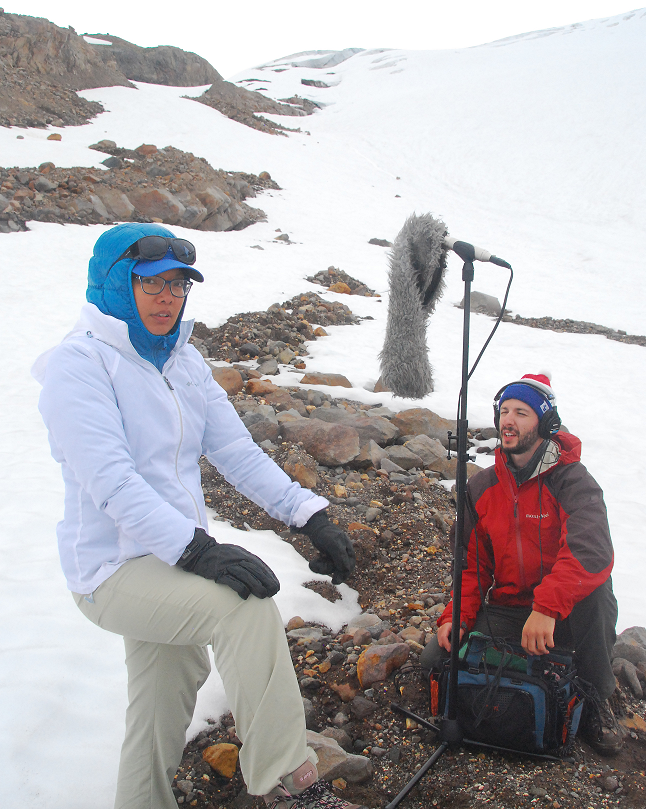 In 2018, ACC gave a fellowship to composer/percussionist Susie Ibarra to research and record along the Ganges River for her ongoing project Himalayan Glacier Soundscapes. What exactly is a glacier soundscape?
In 2018, ACC gave a fellowship to composer/percussionist Susie Ibarra to research and record along the Ganges River for her ongoing project Himalayan Glacier Soundscapes. What exactly is a glacier soundscape?
Prior to embarking on her grant, Ms. Ibarra explained: “the cascading effects of climate change create their own sound; but no one has really bothered to listen. Alongside glaciologist Michele Koppes and a research team, we are recording the sounds of glacial recession and downstream effects along the Ganges River. With Michele, I'll record the sounds of ice melting and people adapting from source to sink."
"Sonic monitoring may be a useful tool, new to science, to document physical and cultural adaption to climate change. Michele has spent over two decades studying how glaciers and landscapes are responding to climate change worldwide; and I myself, as a composer/percussionist/sound artist, have spent the last two decades performing, composing, and mapping to create sonic installations.”
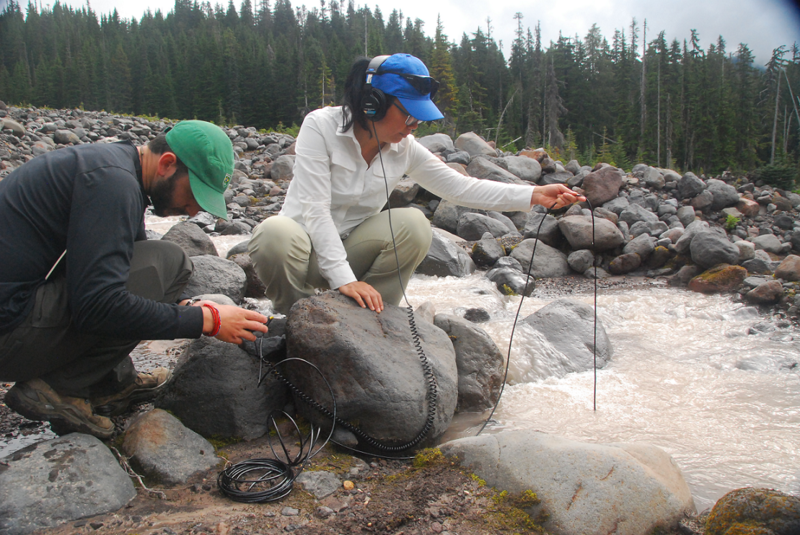
Pictured above: Susie Ibarra records a test run with engineer/musician Jake Landau on Easton Glacier, Washington.
Ms. Ibarra is known for immersive, layered music that explores rhythm, indigenous practices, and interactions between cities and nature. Her projects have ranged from creating a music app mapping water routes in the Medina of Fez to composing and conducting Circadian Rhythms—a work which combines an 80-piece percussion orchestra with a surround soundscape of animal and bird recordings. In 2007, Ms. Ibarra received her first ACC Fellowship to research indigenous music and take kulintang (gong and drum) lessons in Mindanao in the southern Philippines, ultimately producing an album and film exploring contemporary practice in kulintang traditional music. Alongside her research and artistic practice, Ms. Ibarra teaches Performance, Percussion, and Art Intervention at Bennington College.
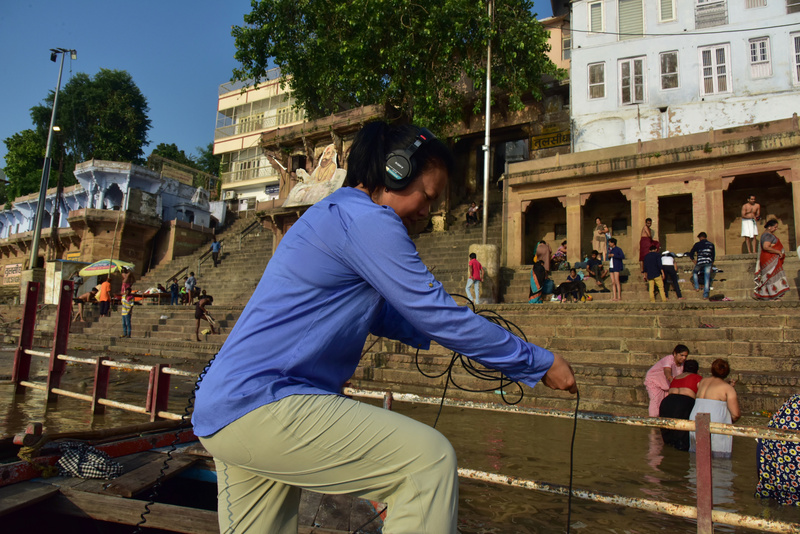
Susie Ibarra recording on the Ganges (photo credit: Rajesh Kumar Singh)
Himalayan Glacier Soundscapes continues Ms. Ibarra’s investigation of nature, community, and place through music. It is a project, Ms. Ibarra explains, “that tells the story about the Earth’s water and its water cultures in the face of climate change.” Utilizing hydrophones for ongoing data collection, Ms. Ibarra has set out to make “an immersive soundscape that will run from the high Himalayas at 22,000 ft to the Ganges Delta over a course of 1,200 miles—an evocative and immersive sonic journey that captures life and nature along an edge of intense climate impacts.”
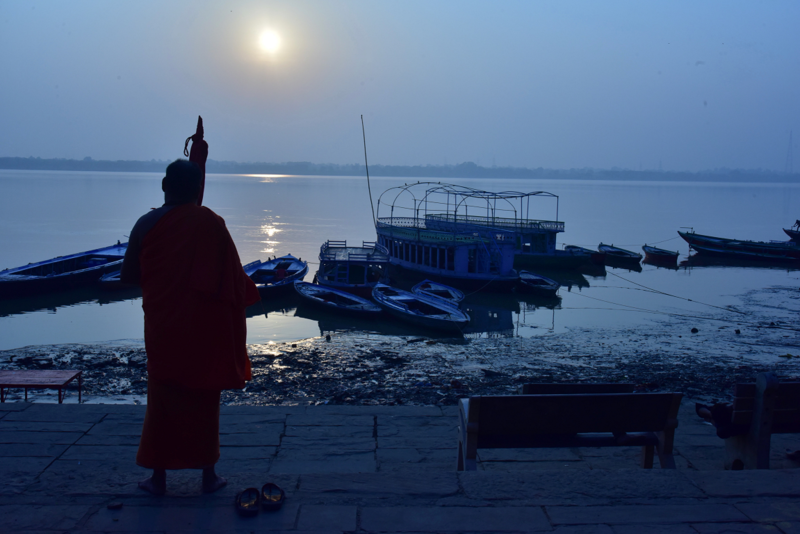
Photo from Susie Ibarra's research trip in Varanasi and Sarnath (photo credit: Rajesh Kumar Singh)
During her fellowship in India, ACC connected Ms. Ibarra to Vibha Galhotra (ACC 2016), the Delhi-based conceptual artist whose large-scale installations—and paintings using polluted river sediment—similarly address environmental changes and the effects on land, cities, communities, and sustainability. Ms. Galhotra, in turn, introduced Ms. Ibarra to Rajesh Kumar Singh, Varanasi-based filmmaker/photographer, to work with Ms. Ibarra in her field documentation. “ACC’s gift of connecting and collaborating with these artists in India,” says Ms. Ibarra, “exposed me to layers of life and culture I would have otherwise never seen.”
below: Susie Ibarra recording on the Ganges with Jake Landau (photo credite: Rajesh Kumar Singh)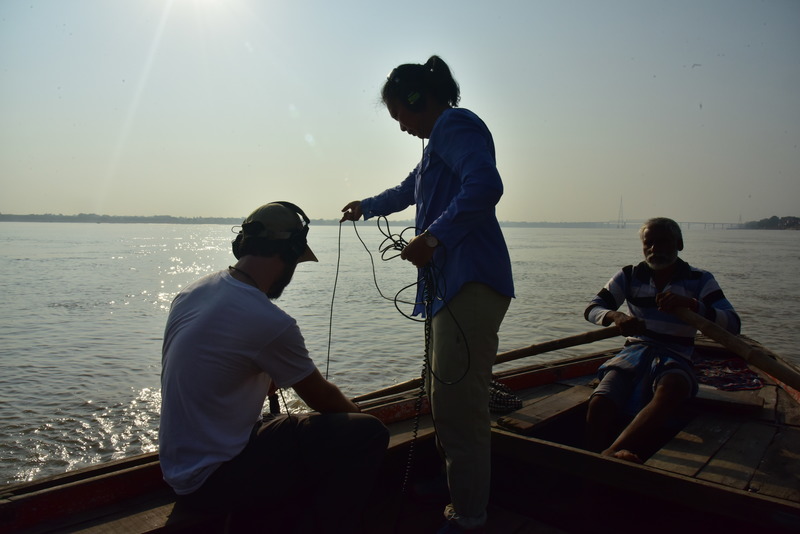
 ACC New York
ACC New York